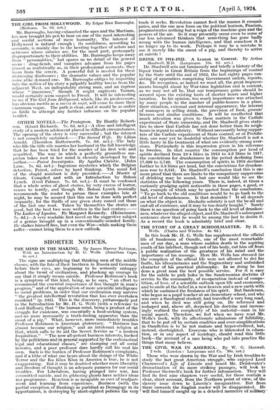In this book Mr. H. G. Wells has supplemented the
official life of Sanderson of Oundle, one of the most remarkable men of our day, a man whose sudden death in the aspiring youth of his intellect, though not of his body, cut him off from a public realization of the greatness of his mind and the importance of his message. Here Mr. Wells has stressed (as the compilers of the official life were not allowed to do) his faults, his idiosyncrasies and the fragmentary and unfinished character of his practical philosophy. fa so doing he has done a great man the best possible service. For it is easy for the subtle to pick holes in the Sandersonian doctrine o1 service to the community, of co-operation instead of compe- tition, of love, of a scientific outlook upon life and economics, and to smile at the belief inn new heaven and a new earth with which he sustained the freshness of his spirit. But Sanderson, who began as a pupil teacher at an elementary school, and who was once a theological student, had travelled a very long road, and when he died was still going on. He reformed and reshaped and, above all, deepened his doctrine and increas- ingly realized the complexity of his material—man in his social aspect. Therefore, we feel when we have read Mr. Wells's book, with its affectionate admissions of fallibility, that to be put off by certain crudities- and over-simplifications in Oundleism is to be not mature and hyper-civilized, but, instead, shortsighted. Everyone who -is interested in educa- tion, or in any aspect of sociology, should read this little book—the account of a rare being who put into practice the things that many believe.


























































 Previous page
Previous page